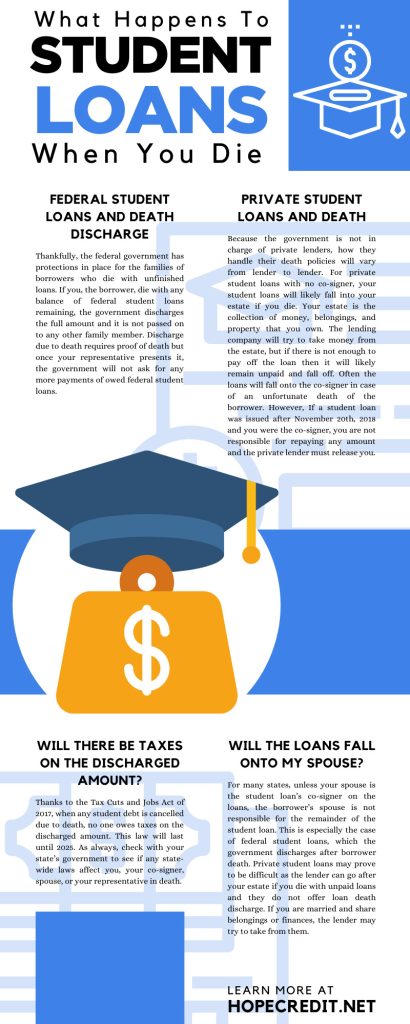What Happens to Student Loans When You Die?
Understanding the fate of your student loans after death is crucial for both borrowers and their families. This guide explores how federal and private student loans are handled upon death, the implications for co-signers and spouses, and the tax considerations involved. LendingTree+3Bankrate+3LendingTree+3
Federal Student Loans and Death Discharge
Federal student loans are discharged upon the borrower’s death. This means the remaining balance is forgiven, and no further payments are required from the borrower’s family or estate. To initiate this discharge, a death certificate must be submitted to the loan servicer. Once processed, the debt is canceled, providing relief to the deceased’s family.
Parent PLUS Loans: Discharge Upon Death
Parent PLUS loans, taken out by parents to pay for their child’s education, are also discharged upon the death of either the parent or the student. This discharge ensures that the surviving party is not burdened with the loan debt. Documentation, such as a death certificate, must be provided to the loan servicer to process the discharge.Investopedia
Private Student Loans and Death: What You Need to Know
Unlike federal loans, private student loans do not have uniform policies regarding discharge upon death. Some private lenders may discharge the loan, while others may not. It’s essential to review the loan agreement to understand the specific terms. In cases where the loan is not discharged, the debt may become part of the borrower’s estate and could be pursued by the lender.
Co-Signer Responsibilities After Borrower’s Death
If a private student loan has a co-signer, the responsibility for the loan may transfer to the co-signer upon the borrower’s death. In some instances, the lender may accelerate the loan, requiring immediate repayment. It’s advisable for co-signers to be aware of the loan terms and consider options like co-signer release or refinancing to mitigate potential liabilities.
Spouse’s Liability for Student Loans
In community property states, a spouse may be held responsible for the deceased partner’s student loans, including private loans. States with community property laws include Arizona, California, Idaho, Louisiana, Nevada, New Mexico, Texas, Washington, and Wisconsin. However, in non-community property states, the surviving spouse typically is not liable for the deceased’s student loans unless they were a co-signer.
Tax Implications of Discharged Student Loans
Under the Tax Cuts and Jobs Act of 2017, student loan debt discharged due to the borrower’s death is not considered taxable income. This provision applies to both federal and private student loans and is effective through 2025. It’s important to consult with a tax professional to understand any potential state-specific tax implications.
Steps to Take: Protecting Your Family from Student Loan Debt
To ensure your family is not burdened with student loan debt upon your death:
Consult professionals: Seek advice from financial advisors or estate planners to make informed decisions.
Maintain clear records: Keep all loan documents and account information organized. LendingTree
Designate a trusted individual: Appoint someone to handle your financial matters in the event of your death.
Consider life insurance: A life insurance policy can provide funds to cover outstanding loans.
Review loan agreements: Understand the terms and conditions of your loans, including discharge policies. Bankrate
Hope Credit can provide you with student loan professionals who can get you through the fear and doubt.
CALL FOR A FREE QUOTE: (760) 916-9313 Or Contact Us: HopeCredit.net/contact-us/

